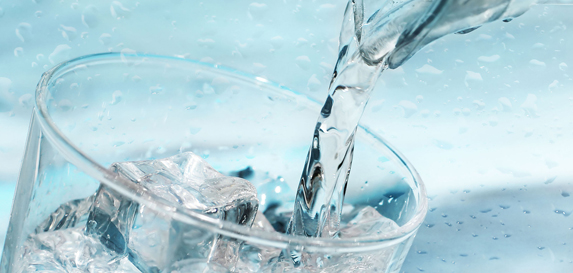
Uncover tips and learn about the benefits of staying properly hydrated every day.
Did you know water makes up more than half of your body weight? Each cell and every organ depends on water to work properly. It’s why staying hydrated should be a priority for everyone.
If you’re in treatment, it can provide additional health benefits. Taking in enough fluid can even help prevent and relieve other side effects of your treatments. Staying hydrated helps:
- Improve your mood, memory and ability to focus
- Rid your body of waste and toxins—and keep vital minerals balanced
- Produce saliva and reduce dry mouth
- Prevent headaches and joint pain
- Keep your digestive system functioning and help prevent constipation
- Your muscles work as they should
How Much Water You Need
Hydration comes from what we drink and eat throughout the day. Experts estimate water and other beverages account for 80 percent of our hydration, with food making up the other 20 percent.
The recommended total daily amount of water—including non-alcoholic drinks and food—is 91 ounces for women and 125 ounces for men.
| Water bottle (16.9 ounces) | 12 ounce glass | 8 ounce glass | |
|---|---|---|---|
| Women | 4.5 | 6 | 9 |
| Men | 6 | 8.5 | 12.5 |
So, how much water should you drink each day? On average, women should drink four and a half bottles of water, and men should drink six bottles of water each day.
To help reach your goal, carry a reusable bottle and sip fluids throughout the day. This way, you can fill up almost anywhere there is a sink. Don’t like the taste of tap water? Choose a water bottle with a built-in filter.
Other Ways to Hydrate
Many fresh fruits and vegetables have high water content, which makes them the perfect healthy snack. Try these nutritional nuggets, which are more than 80 percent water:
- Vegetables: Lettuce, celery, cauliflower, sweet peppers, broccoli and carrots
- Fruits: Watermelon, strawberries, cantaloupe, oranges, apples, peaches and grapes
Some fruits and vegetables are off limits during certain treatments, so be sure to talk with your doctor.
While water is the healthiest option, low-fat milk, smoothies and fruit juices without added sugar are good alternatives and will also provide needed nutrition when you are having difficulties eating.
Skip alcohol and caffeinated drinks like coffee, tea and sodas, as they can lead to dehydration.
When to Call Your Doctor
During treatment, side effects, such as vomiting and diarrhea, can increase the risk of dehydration. Your doctor will let you know the best way to stay hydrated and manage side effects specific to your care plan.
Mild dehydration can be treated easily by increasing fluid intake, but moderate or severe cases pose a greater health risk. Contact your care team immediately if you:
- Have a fever above 100.4 degrees Fahrenheit
- Can’t keep fluids down or drink fluids
- Have diarrhea lasting 24 hours or more
- Have dark urine, less urine than normal, or can’t urinate for 12 hours or more
- Become dizzy or feel faint when standing up
- Feel confused or lost
